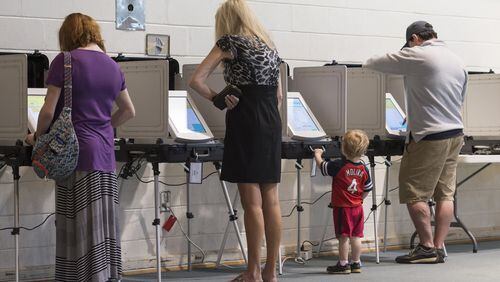Eleven voters have asked Georgia Secretary of State Brian Kemp to review the state’s voting system ahead of next month’s hotly contested 6th Congressional District runoff.
The request is allowed under state law. It comes after one of the three counties in the district — Fulton — experienced a technical snafu on April 18 that delayed reported election results in the race. It also follows a letter to Kemp in March from a group of voting advocates who recommended that the state overhaul its elections system and begin using a system with a paper audit trail.
“We’ve received their letter, and we will provide a timeline and cost estimate for the review,” said Candice Broce, a spokeswoman for Kemp. “Georgia’s voting equipment is regularly tested by experts and local elections officials across the state. We have complete confidence in its accuracy and security.”
Georgia uses "direct-recording electronic" voting machines, or DREs, known by voters for their touch screens. The state committed to the machines in 2002 when it last overhauled its elections system. At the same time, it also eliminated a paper trail of recorded votes.
The request dovetails with a push by advocates for Georgia to commit to a new system, with new machines and technology. Such a commitment would require tens of millions of dollars and would have to be implemented statewide. Advocates argue that such an update would increase the system’s security and give voters confidence in the results.
Georgia experienced no major problems with the presidential election last year, and the current system has different layers of security and controls built into it to limit and detect unauthorized access.
Fulton officials last month called the reporting delay on a "rare error" involving a memory card that didn't properly upload its vote tallies.







